- Portals
- The Current Year
- ED in the News
- Admins
- Help ED Rebuild
- Archive
- ED Bookmarklet
- Donate Bitcoin
Contact an admin on Discord or EDF if you want an account. Also fuck bots.
Wikipedia's Greatest Hits Racism
—From Ethnic Joke. | ||
Racism, being a festering breeding ground for drama in today’s current witch-hunt mentality and media is an incredibly massive shit magnet for any idiot who manages to plug a modem into that plastic plate thingy on the wall. It is no surprise that sweeping mistakes, ad hominem statements, and imbecilic writing are not minor glitches on Wikipedia, but in rather, the de facto norm on that website.
Right from the start, it must be noted, quite humorously, that the very page that details Racism on Wikipedia is topped by a template that discusses the article’s use of “weasel words.” Yes, it is humorous, but at the same time it might also be considered tragic. Does not the mighty internet behemoth of Wikipedia consider itself “the source” of most living knowledge? If this is so, why can’t it seem to reign in its editors for the greater good? Why can’t it forcibly constrain these “weasel words” and relegate them to some far off gulag, there to freeze to death in a starving hole in the ground? Again, the answer is quite simple, Wikipedia is edited by incapable idiots and read by simpering morons, and it is this very marriage that creates major lulz on that Wiki…which transports to even greater absurdity on this Wiki.
Found on And you are lynching negros
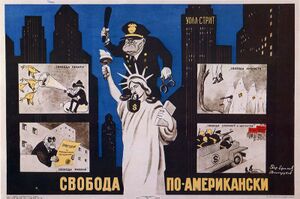
- There were numerous versions of the quip. In a 1962 version, an American and a Soviet car salesmen argue which country makes better cars. Finally, the American asks: "How many decades does an average Soviet man need to work to save for your car?" After a thoughtful pause, the Soviet replies: "And you are lynching Negroes!"
Found in the template at the top of Racism
| What the hell is a "weasel word?" Whatever they are, this section might have them in it. |
- Weasel words are phrases that are evasive, ambiguous or misleading. On Wikipedia, the term refers to evasive, ambiguous or misleading attribution. Weasel words can present an apparent force of authority seemingly supporting statements without allowing the reader to decide whether the source of the opinion is reliable, or they can call into question a statement. If a statement can't stand without weasel words, it does not express a neutral point of view; either a source for the statement should be found, or the statement should be removed. If, on the other hand, a statement can stand without such words, their inclusion may undermine its neutrality, and the statement will generally be better off without them.
see also: Avoid weasel words.
Found On Racism

- Owen 'Alik Shahadah comments on this racism by stating: "Historically Africans are made to sway like leaves on the wind, impervious and indifferent to any form of civilization, a people absent from scientific discovery, philosophy or the higher arts. We are left to believe that almost nothing can come out of Africa, other than raw material."
- Scottish philosopher and economist David Hume said, "I am apt to suspect the Negroes to be naturally inferior to the Whites. There scarcely ever was a civilised nation of that complexion, nor even any individual, eminent either in action or in speculation. No ingenious manufacture among them, no arts, no sciences."[29] German philosopher Immanuel Kant stated: "The yellow Indians do have a meagre talent. The Negroes are far below them, and at the lowest point are a part of the American people."
- In the nineteenth century, the German philosopher Georg Wilhelm Friedrich Hegel declared that "Africa is no historical part of the world." Hegel further claimed that blacks had no "sense of personality; their spirit sleeps, remains sunk in itself, makes no advance, and thus parallels the compact, undifferentiated mass of the African continent" (On Blackness Without Blacks: Essays on the Image of the Black in Germany, Boston: C.W. Hall, 1982, p. 94).
- Before being disqualified in the 20th century by the American school of cultural anthropology (Franz Boas, etc.), the British school of social anthropology (Bronisław Malinowski, Alfred Radcliffe-Brown, etc.), the French school of ethnology (Claude Lévi-Strauss, etc.), as well as the discovery of the neo-Darwinian synthesis, such sciences, in particular anthropometry, were used to deduce behaviours and psychological characteristics from outward, physical appearances.
Found on Affirmative Action

- The examples and perspective in this section deal primarily with the United States and do not represent a worldwide view of the subject. Please improve this article and discuss the issue on the talk page.
- In some countries which have laws on racial equality, affirmative action is rendered illegal because it doesn't treat all races equally. This approach of equal treatment is sometimes described as being "color blind", in hopes that it is effective against discrimination without engaging in reverse discrimination. In such countries, the focus tends to be on ensuring equal opportunity and, for example, targeted advertising campaigns to encourage ethnic minority candidates to join the police force. This is sometimes described as "positive action" or "positive discrimination".
- In most Canadian Universities, people of Aboriginal background normally have lower entrance requirements and are eligible to receive exclusive scholarships.
Found on Ron Karenga (creator of Kwanzaa)
- Deborah Jones, who once was given the title of an African queen, said she and Gail Davis were whipped with an electrical cord and beaten with a karate baton after being ordered to remove their clothes. She testified that a hot soldering iron was placed in Miss Davis' mouth and placed against Miss Davis' face and that one of her own big toes was tightened in a vise. Karenga, head of US, also put detergent and running hoses in their mouths, she said.
Found on African American
- African Americans (also referred to as Black Americans or Afro-Americans) are citizens or residents of the United States who have origins in any of the black populations of Africa.
EDiot's note - Because you cannot be Caucasian, Mongoloid, or Aboriginal and be from Africa.
Found on Historical definitions of race
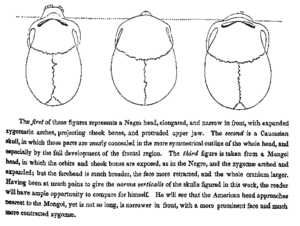
- America became white—the people who, as they claim, "settled" the country became white—because of the necessity of denying the Black presence, and justifying the Black subjugation. No community can be based on such a principle—or, in other words, no community can be established on so genocidal a lie. White men from Norway, for example, where they were Norwegians—became white: by slaughtering the cattle, poisoning the well, torching the houses, massacring Native Americans, raping Black women. . . Because they are white, they cannot allow themselves to be tormented by the suspicion that all men are brothers.
Found on Race and Intelligence
- Most of the evidence of intelligence differences between racial and ethnic groups is based on studies of intelligence test scores. Intelligence tests measure many important abilities, such as verbal and quantitative reasoning, and can predict socially-relevant outcomes such as academic performance and occupational outcomes.
- Using Western standards, this would mean that African countries evidencing such a low IQ would be largely dysfunctional.
Found on Racism in Asia

- Japanese society, with its ideology of homogeneity, has traditionally been intolerant of ethnic and other differences. It is safe to say that there has been a strong sense of xenophobia since it has opened borders to foreigners. For example, the Dutch sailors landed on the Japanese shore were characterized by their "butter-like" body odor, hairiness, and unsophisticated behavior.
Found on Engrish
- "The term itself relates to Japanese speakers' tendency to inadvertently substitute the English phonemes "R" and "L" for one another..."
- "...as well as difficulties in distinguishing l and r all contribute to substantial problems using English effectively.[1]"
Found on Howard Cosell
- "Look at that little monkey run!"
Found on Dusty Baker
- In 2003, Baker was the subject of some controversy when he stated that "black and Hispanic players are better suited to playing in the sun and heat than white players."
Found on Jimmy the Greek
- The black is a better athlete to begin with because he's been bred to be that way — because of his high thighs and big thighs that goes up into his back, and they can jump higher and run faster because of their bigger thighs. This goes back all the way to the Civil War when during the slave trading, the owner — the slave owner would breed his big black to his big woman so that he could have a big black kid.
Found on Sammy Sosa
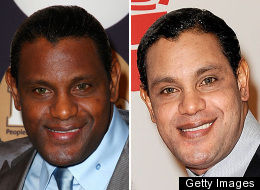
- Sosa has recently come under scrutiny for his use of a bleaching cream that has made him several shades lighter than his natural color. He admits that the skin softening cream he used has a bleaching agent, and that he uses it every night
Found on Institutional racism
- The Canadian government passed The Chinese Immigration Act, 1885 levying a $50 Head Tax upon all Chinese immigrating to Canada. When the 1885 act failed to deter Chinese immigration, the Canadian government then passed The Chinese Immigration Act, 1900, increasing the head tax to $100, and, upon that act failing, passed The Chinese Immigration Act, 1904 increasing the head tax (landing fee) to $500, equivalent to $8000 in 2003.
Found on Skin whitening
- Today, skin whitening products are available in the form of creams, pills, soaps or lotions. The mechanism of permanent whitening is usually by the breakdown of melanin by enzymes, such as that contained in the droppings of the Japanese bush warbler.
Found on Acting white
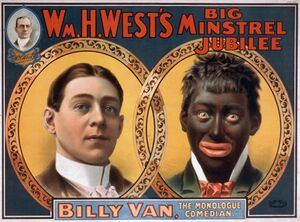
- Acting white is a pejorative term usually applied to African-Americans, although also within other non-white ethnic groups such as Latinos or Hispanics*, which refers to a person's perceived betrayal of their culture by assuming the social expectations of white society.[1][2] Success in education in particular is seen as a form of selling out by being disloyal to one's culture.
- In 1986, Signithia Fordham co-authored with Nigerian sociologist John Ogbu a study that concluded that high-performing African American students in a Washington, D.C. high school borrowed from hegemonic white culture as part of a strategy for achievement.
- In African American folklore, the sea crab ranks among the dumbest of creatures who also offers a valuable lesson. When you catch a bucket or a basketful, you never have to put a lid on because when one of the creatures tries to get out, the others will just pull it back in. Some of our fellow human beings aren't much smarter than that. When they see you working hard to achieve your dreams, they'll make fun of you just for trying.
According to economist Roland G. Fryer, Jr., some of the behaviors commonly viewed as acting white are:
- Getting high grades in classes.
- Speaking standard American English.
- Using strict diction in one's words.
- Answering questions asked by the teacher in class.
- Enrolling in Advanced Placement or Honors classes.
- Shopping at The Gap or Abercrombie & Fitch for clothes.
- Avoiding wearing clothes from FUBU and Tommy Hilfiger.
- Wearing shorts in Winter.
*EDiot's note - Because you cannot be white if you speak Spanish or have a Spanish name.
Found on Stereotypes of African Americans
- This stereotype gained notoriety through the 1898 children's book The Story of Little Black Sambo by Helen Bannerman. It told the story of a boy named Sambo who outwitted a group of hungry tigers. The original text suggested that Sambo lived in India, but this fact may have escaped many readers. The book has often been considered to be a slur against Africans.
Found on Magical Negro
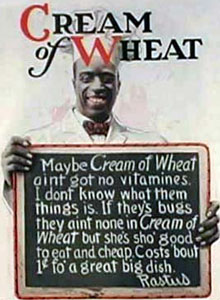
Examples of magical negroes as published by social commentators include:
- Noah Cullen (Sidney Poitier) in the film The Defiant Ones (1958)
- Also Poitier in To Sir, With Love, Lilies of the Field and Guess Who's Coming to Dinner, the last "particularly striking in this regard, as it posits miscegenation without evoking sex. (Talk about magic!)" Quote from Ehrenstein.
The magical negro is a recurring archetype in Stephen King's novels as well as some adaptations of his work:
- 8 Dick Hallorann in The Shining (1977), and in both the 1980 film adaptation (Scatman Crothers) and the 1997 TV miniseries (Melvin Van Peebles)[2]
- Mother Abagail in The Stand (1978), and the 1994 TV adaptation (Ruby Dee)
- John Coffey in The Green Mile (1996), and the 1999 film adaptation (Michael Clarke Duncan)
- Moses the Clock Man (Bill Cobbs) in the film The Hudsucker Proxy (1994)
- Cash (Don Cheadle) in the film The Family Man (2000)
- Bagger Vance (Will Smith) in the film The Legend of Bagger Vance (2000)
- Gloria Dump (Cicely Tyson) in the film Because of Winn-Dixie (2005)
- God (Morgan Freeman) in the films Bruce Almighty (2003) and Evan Almighty (2007).
- Eddie "Scrap Iron" Dupris (Morgan Freeman) in Million Dollar Baby (2004)
- Oracle (Gloria Foster/Mary Alice) in The Matrix (1999).
- Lamont (Guy Torry) in the film American History X (1998).
- The "Blind Seer" (Lee Weaver) and Tommy Johnson (Chris Thomas King) in O Brother, Where Art Thou? (2000)
Found on Uncle Ben’s
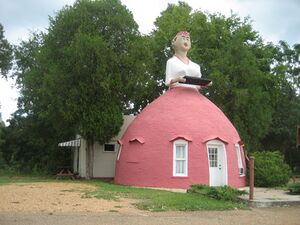
- After 61 years as a servant/maitre d’hotel/farmer, in March 2007, Uncle Ben's image was "promoted" to the "chairman of the board" by a new advertising campaign designed to distance the brand from its stereotyped iconography depicting a domestic servant. A visit to the company website reveals a set of impressive double doors and a plaque reading "Chairman." The doors open into an executive-style office overlaid with a welcome message from Uncle Ben that begins, "Hello, I'm Uncle Ben." The name plate on the desk also reads "Chairman," and a portrait of the iconic marketing image hangs on the back wall. The boardroom is interactive, allowing visitors to click on sundry objects for additional information.
Found on Rastus
- The image is believed to be from a photograph of Frank L. White, a Chicago chef who reportedly was paid five dollars to pose in a chef's hat and jacket. His face has been featured on the box with only slight modifications until the present day.
Found on Euphemism
- lame → crippled → handicapped → disabled → physically challenged → differently abled
- shell shock (World War I) → battle fatigue (World War II) → operational exhaustion (Korean War) → posttraumatic stress disorder (Vietnam War)
- The difference between the British and American connotations of "spastic" was starkly shown in 2006 when golf great Tiger Woods used "spaz" to describe his putting in that year's Masters. The remark went completely unnoticed in America, but caused a major uproar in the UK.
Pages of Interest
- Political Correctness
- Anti-racist mathematics
- Race-baiting
- Race card
- Satiric misspelling
- Speech code
Summation
While every effort has been used to bring you these quirks and missteps perpetrated by Wikipedia, it must be stressed that this article by no means can attempt to describe the full broadness and width of scope afforded by Wikipedia's tens of thousands of pages on this particular subject. Any additions within context will be warmly welcomed.
See also

|
Wikipedia's Greatest Hits Racism is part of a series on Visit the Wikipedia Portal for complete coverage. |
| Featured article January 4, 2010 | ||
| Preceded by Food Not Bombs |
Wikipedia's Greatest Hits Racism | Succeeded by Fat Chicks in Party Hats |
